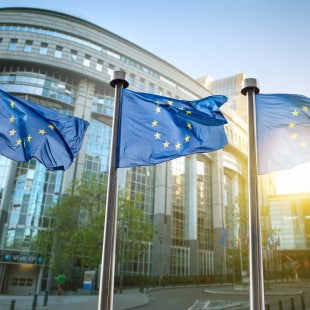Economic shock caused by the health crisis: was reaction by European authorities sufficiently swift?
The suddenness of the Covid-19 crisis triggered a substantial response in fiscal policies in Europe and the eurozone, both at national and supranational levels. Eurozone member States reacted swiftly and boldly, using fiscal measures. The response by Member States sought to reduce the risk of business failures and an increase in redundancies and thus pave the way to a vigorous recovery from the crisis. Government intervention has involved various instruments: massive use of short-time working schemes, deferral of social security contributions for companies, state-guaranteed loans, etc. These measures will result in a significant deterioration of Member States' public finances in 2020. The latest International Monetary Fund forecasts suggest that the aggregate Eurozone public deficit will hit a record level of 10.1% of GDP in 2020, with debt rising above the 100% of GDP threshold for the first time ever, to 101.1%. The risks associated with these increases are, however, limited – for the short term at least – thanks to the massive intervention by the European Central Bank (ECB), which has helped hold interest rates at very low levels.
Rebalancing public finances: Europe's priority in the short term?
The deterioration of public finances in all European countries appears to have been accepted. The massive intervention by governments has been necessary to absorb some of the shock of Covid-19, and the issue of reducing government deficits and debts is a matter for a later date. In the past, and particularly in the aftermath of the sovereign debt crisis, member states tightened their fiscal policies too quickly, which hampered the economic recovery. European authorities’ responses to the current crisis thus mark a clear positive change in this respect. Fiscal rules have been relaxed, in particular those concerning the 3% of GDP limit for government deficits and the 60% of GDP limit for public debt. This increased flexibility has helped in tackling the economic downturn caused by the pandemic. Additional measures were subsequently approved by the European Council of the heads of state of the 27 EU members. In particular, financial assistance, in the form of loans from the EU to member states, has been provided, chiefly to help cover the increased take-up of short-time working schemes.
The European Recovery Fund: a major step forward in battling the health crisis? And for Europe ?
During this crisis, Europe has managed to work through some of its taboos. Although far from perfect, the agreement around the European recovery plan is a major step forward. The plan will be funded by borrowing contracted at the EU level, and will combine EUR360 billion in loans to member states with grants of EUR390 billion, something which was unthinkable only a few weeks ago. For the Eurozone, this implies that the fight against the crisis is no longer the sole responsibility of the ECB (beyond, of course, support at national level) but is now also being addressed in Union-wide fiscal policy. The roll-out of this recovery plan and the targeting of grants to countries most in need should support confidence and improve the effectiveness of monetary policy. The recovery plan has clear priorities.
In order to qualify for loans and grants from the European programme, Member States’ recovery plans must focus on improving growth potential and employment and contribute to the green and digital transitions. The effective implementation of the plan will not be easy, and there are some areas of disagreement, such as that regarding the European Union’s need to raise its own tax resources in order to repay the subsidies granted.
Will the French response "France Relance" be up to the task against Covid-19?
In the draft 2021 budget, the French government forecasts budget deficits of 10.2% of GDP in 2020 followed by 6.7% in 2021. The public debt ratio is expected to rise by 20 points, to 117.5%, in 2020, before declining slightly, to 116.2%, in 2021. The difficulty with this 2021 budget does not lie in meeting its fiscal targets, so much as in its effectiveness in cushioning the crisis and supporting the recovery. More precisely, the emergency measures taken in the spring (and extended this autumn) have effectively cushioned the economic shock caused by lockdown; the debate is about the extent and speed of the positive effects to be expected from the recovery plan.
The plan, known as France Relance, is based on three pillars: the environment, competitiveness and cohesion, each allocated around one-third of the total EUR100 billion budget between 2020 and 2022. The plan is a mix of supply-side and demand-side measures, with seemingly some emphasis on the former, as certain measures (such as short-time working and energy renovation) fall into both categories. Over 2021-2022, the demand side is expected to produce 75% of the additional 1 point of growth forecast by the government. Supply-side measures will then pick up the running and are expected to add a further 1 point of growth over the long term.
Government's forecast in 2021
growth forecast
growth of business investment
growth of household consumption
What should also be retained from the government's forecast of 8% growth in 2021 (after -10% in 2020) is, on the one hand, the particularly vigorous growth of business investment (+15% after -15%) and, on the other hand, the more moderate growth of household consumption (+6% after -8%). The former is driven by the rapid expected recovery in profit margins, in turn driven by the EUR10 billion cut in production taxes. The latter is undermined by the persistence of uncertainties on the health and labour market front, that is limiting the reduction in forced savings built up during lockdown. The household savings rate would lose only 3 of the 6 points by which it increased in 2020. However, the resurgence of the Covid-19 epidemic and the announcement of a new lockdown, lasting until at least 1 December, create significant downside risk for this scenario and for the budget forecasts.
Hélène Baudchon, Louis Boisset



